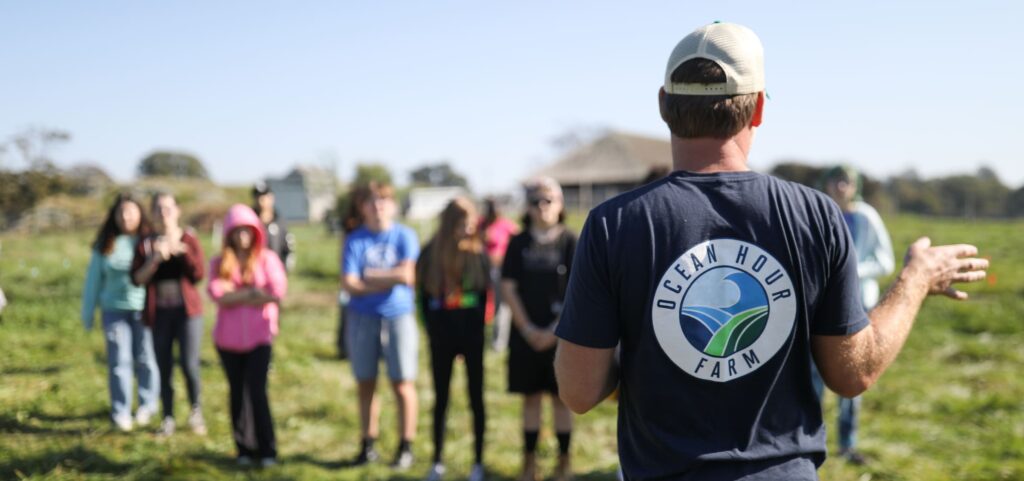Summer 2025: Regenerative Land Care Tours at Ocean Hour Farm
- Farm News, Featured
- Events, Land Use, Ocean Health


The guided tour will take visitors around the active farm and historic property, showcasing our sustainable agriculture and regenerative land care practices. Our integrated system features local plants, livestock, and people working together to sequester carbon, clean stormwater, build soil, and produce food and fiber.
80% of ocean pollution comes from land. Whether we’re trying to make our lawns green or our gardens pest-free, chemical fertilizers, herbicides, and pesticides run off into our storm drains, creeks and bays, eventually making their way into the ocean. This creates persistent problems like red tides, beach closures, and stinky seas.
Each visitor will learn how to make choices about their lawns and gardens that build healthy soils, which in turn lead to healthy seas.
We want to empower more people to make choices about their lawns and gardens that build healthy soils, which leads to healthy seas. This tour will feature Ocean Hour Farm’s work through the lens of how individuals can support our overall mission to make Narragansett Bay and the ocean cleaner and healthier. Examples include rain gardens, meadows, composting and companion planting.
Each tour will walk across the 43-acre property, viewing our different land units, from pasture to wetlands to a food forest. You’ll get a chance to see our ‘flerd,’ a mixed-species grazing group that at our farm is comprised of sheep, chickens, cows, pigs, and our guardian llama, Nyx. The animals rotate through our pasture system to graze on grass and regenerate the soil.
Our team will share how everyone plays a role in slowing and cleaning water before it reaches the ocean and how compost is critical in this process. The tour will be information-packed and best suited for ages 12 and over. An adult must accompany anyone under 18.
The two-hour tours are free but require registration on Eventbrite. Due to limited parking and the interactive format, attendance is capped at 25 participants.
Tour 1: Friday, June 27, 2025, 2 to 4 p.m.
Tour 2: Wednesday, July 16, 2025, 3 to 5 p.m.
Tour 3: Tuesday, Aug. 12, 2025, 3 to 5 p.m.
Tour 4: Friday, Sept. 26, 2025, 2 to 4 p.m.
Will each tour be the same?
Yes, each of the four tours this summer will cover the same topic and areas of the farm. Please make space for as many people as possible to attend, and refrain from signing up twice.
Can we come early or stay late to picnic, take photos, etc?
No, since this is a working farm, all guests must be accompanied by a staff member. This tour is offered when we have dedicated staff available to accompany guests.
Where can we park?
You cannot park on Harrison Avenue and will need to park on-site. We will allow cars to enter starting 15 minutes before the event, and staff will direct you to the designated parking area. Please bring your whole group in one car and carpool whenever possible. Parking spaces on-site are limited.
Can we bring a pet?
No, we have working animals on-site and cannot allow pets. If you have an ADA Service Animal, please get in touch with us.
How do I get to Ocean Hour Farm?
Our address is 152 Harrison Ave, Newport, RI 02840. Please ensure you stay on Harrison Ave. Some GPS systems will route you to the Beacon Hill Road entrance, but this gate will not open. The Harrison Ave gate will be open on the day of the tour. Please proceed straight down the paved driveway.
What time should I arrive?
We will open the gate 15 minutes before the tour’s start and check in guests as they arrive.
Is this the same as the SVF Visitors Day?
No, Ocean Hour Farm is a new organization that has been stewarding this historic property since 2022. We have a new mission and will take you on a guided tour around the property. To learn more about our work, visit: https://oceanhourfarm.org/
FURTHER QUESTION?
If you still have questions, please contact us at info@oceanhourfarm.org or (401) 846-1814.
Ocean Hour Farm is a center for education, research, and demonstration of regenerative practices, highlighting the critical connection between land and ocean health. The Farm provides a living example of sustainable agriculture and land stewardship as an integrated system where plants, animals, and people sequester carbon, clean stormwater, build soil and produce food and fiber.